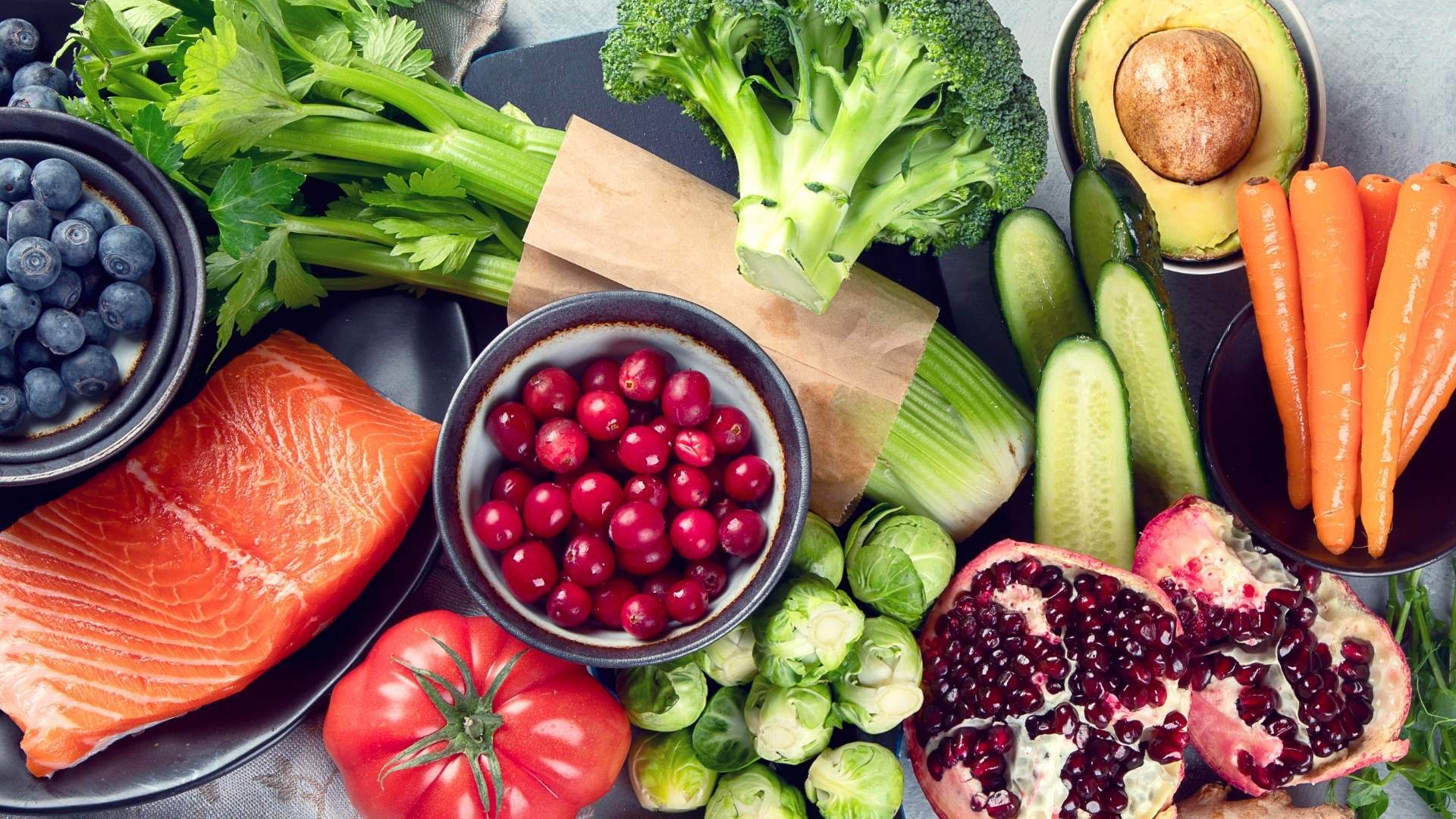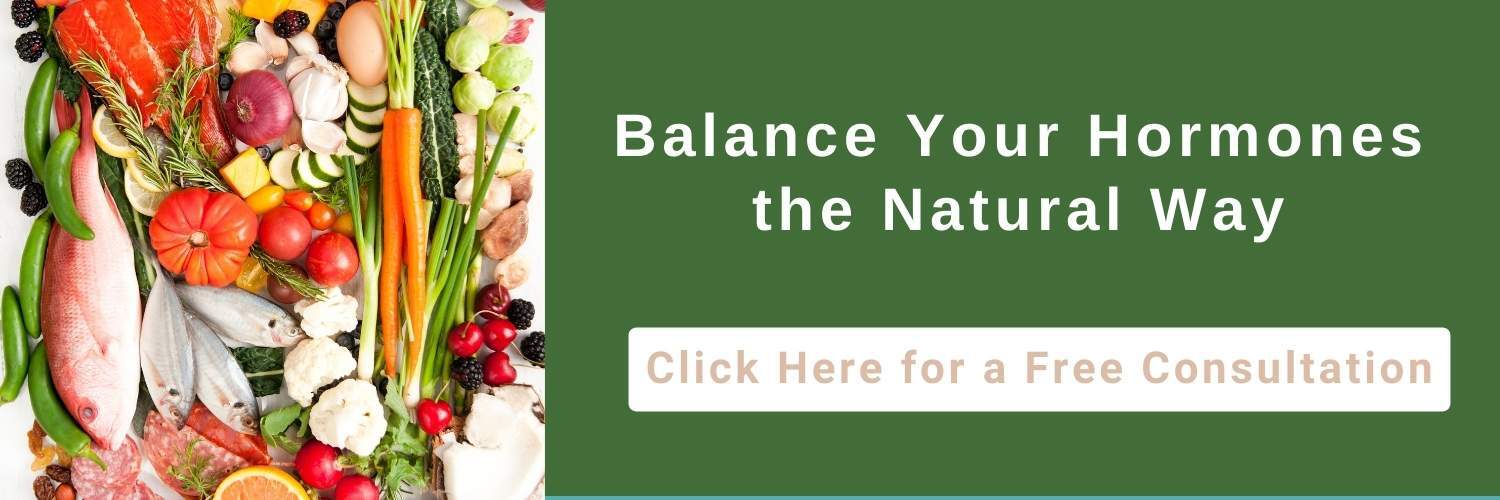Hormone Imbalancing Foods: Everyday Eats That May Be Wreaking Havoc on Your Hormones and Foods to Eat to Get Back on Track
"The content below is not intended to be a substitute for professional medical advice, diagnosis, or treatment. Always seek the advice of your physician or other qualified health provider with any questions you may have regarding a medical condition."
Mom always said –– you are what you eat.
So it’s no surprise that so many of us are struggling with the effects of hormone imbalances in our bodies.
But battling hormone imbalance can mean more than just the occasional mood swing.
Waking up in a pool of sweat or facing the mirror with acne reminiscent of your teenage years can leave you feeling:
- Frustrated
- Embarrassed; and
- Confused
If you’re looking for answers to your hormone imbalance, the solution might be just a few steps away in your refrigerator.
The foods you eat can have a significant effect on the production and excretion of hormones in your body.
What did you have for breakfast today?
Keep reading for your eat this, not that, guide to improving your hormone imbalance.
Table of Contents
How Does Food Affect Your Hormones?
When we think about eating a healthy diet, we usually think in terms of weight or physique.
But the food we eat to nourish our body can also affect our hormones.
Hormones play an essential role in the functioning of our bodies.
Hormones act as chemical messengers in the endocrine system that regulate nearly every process, including:
- Growth and development
- Sleep cycles
- Metabolism
- Digestion
- Fertility
- Stress
- Mood
- Sexual function;
- And more
Eating the right foods can help keep your hormones balanced and your body functioning properly.
7 Hormone Imbalancing Foods to Drop From Your Diet
If you’re among the many women battling hormonal imbalance, you might be regretfully familiar with some of the uncomfortable symptoms, like:
- Unintentional weight gain
- Irregular periods
- Excessive hair growth or hair loss
- Fatigue; or
- Mood swings
It’s important to speak to your doctor if you think you may have a hormonal imbalance and discuss any symptoms, especially those that cause pain and discomfort.
Interested in finding out exactly what foods are affecting your hormone imbalance?
Call Dr. Donna Sergi at HealthierU to schedule a Nutrition Response Testing assessment. She’ll help you pinpoint the root cause of your hormone imbalance and formulate an action plan using natural remedies.
If you’re still exploring your diet, chances are you’ll find the foods you’re eating could be working against you.
It may be time to rid your plate of these seven
hormone imbalancing foods.
#1: Non-Organic Meat and Dairy
The Food and Drug Administration (FDA) has approved six different kinds of hormones for use in non-organic meat and dairy production.
These hormones are commonly used in meat farming to control the animal’s:
- Growth
- Development of fat and muscle
- Feed requirements; and
- Milk production
Injecting animals with hormones is profitable for farmers because it can increase the worth of the meat and make animals cheaper to raise.
But at what cost?
Studies have attributed the presence of steroids in dairy products to an increased risk for prostate and breast cancer.
#2: Non-Organic Vegetables
The Environmental Working Group (EWG) reported more than 70 percent of non-organic fresh produce sold in the United States contains residues of potentially harmful pesticides, even after they are:
- Washed
- Scrubbed; and
- Peeled
Not only does eating fruits and vegetables with high levels of pesticide residue decrease the beneficial effects of fruit and vegetable consumption, but it can also negatively impact fertility.
Many pesticides contain
endocrine-disrupting
chemicals, which can mimic hormones in your body or affect the actions of your hormones.
#3: Processed Foods
Processed and refined foods such as …
- Cookies
- Ready-to-eat meals
- Pastries
- Cured sausages; and
- Most foods found in the pantry
… usually contains high amounts of sodium and preservatives to prolong their shelf life.
Eating foods high in preservatives can increase inflammation and stress on the adrenal glands, causing your hormones to go out of balance.
#4: Caffeine
We all know that caffeine can wreak havoc on your sleep cycle, especially if you consume it too close to bedtime.
But too much caffeine can also affect your hormone health.
That jolt of alertness you get from your morning cup of brew also triggers a release of cortisol, known as the stress hormone, bringing your body to a state of hyper-awareness.
Elevated levels of cortisol can lead to:
- Anxiety
- Depression
- Fatigue
- Weight gain
- Heart disease
- Gastrointestinal problems; and
- Cushing's syndrome
#5: Sugar
Craving something sweet?
Consuming too much sugar can also throw your hormone balance out of whack.
When we eat …
- Sugary
- Processed; or
- Carbohydrate-packed
… foods, it causes a spike in our blood sugar levels.
That sugar surge causes cortisol levels to jump, exhausting the adrenals and deregulating the immune system.
As a result, when our blood sugar levels come down, we need an emergency fix to bring them back up — creating sugar and carb cravings that send us back through the vicious cycle.
This pattern can be especially troublesome for those with:
- Adrenal fatigue
- Hashimoto’s disease
- Graves’ disease; or
- Hypoglycemia
#6: Soy Products
There is plenty of debate surrounding the hormone effects of soy.
Soy products such as …
- Tofu
- Tempeh
- Edamame beans; and
- Miso
… are high in isoflavones, a type of plant-based estrogen commonly found in legumes. The isoflavones in soy possess both estrogen-antagonist and estrogen-protagonist properties, which are determined based on the existing levels of hormones in the body.
In premenopausal women, who already have much higher levels of estrogen, the isoflavones in soy may act as an anti-estrogen, blocking the estrogen receptors in the body.
But in postmenopausal women with lower levels of estrogen, the isoflavones may work to raise estrogen levels, which have been commonly linked to certain types of breast cancer.
Additionally, women with breast cancer whose tumors are classified as either hormone-positive or hormone-negative have responded differently to the estrogens in soy.
So be sure to discuss with your doctor how soy products may be affecting your particular hormone imbalance.
#7: Dairy Products
A rich source of calcium, dairy products can lead to gut inflammation and irritation if consumed in excess.
Organic or not, dairy can also increase sebum production and aggravate acne-prone skin.
So if you love your cheese or glass of warm milk at bedtime, consider consuming your dairy in moderation.
5 Fantastic Foods for Hormonal Imbalance Treatment
Adjusting your diet to account for the hormonal effects some foods can have on your body is the most natural way to help your body heal itself.
No doubt, if there are some hormone imbalancing foods, there are foods that balance your hormones.
Now that you know the foods that can send the wrong hormones into overdrive, here are five super-foods that can help keep your hormones in sync.
#1: Salmon
The “good” fat in salmon can raise the hormones used by the endocrine system to communicate with the brain, giving your mood and cognitive skills a boost.
Salmon is known to be high in omega-3 fatty acids, which help to stabilize your hunger hormones, keeping you from returning to the refrigerator too soon.
High levels of vitamin D in salmon can play an important role in women’s health as it’s converted to the active hormone, calcitriol, which reduces the risk of …
- Heart disease
- Cancer
- Inflammation; and
- Autoimmune disease
… and regulates testosterone levels.
Bonus foods that are high in omega-3s include:
- Albacore tuna
- Walnuts
- Flaxseed
- Olive oil
- Chia seeds; and
- Avocados
#2: Avocados
Avocados have long been hailed as one of the healthiest fruits –– wait, what? That’s right, avocados are technically considered single-seeded berries.
Rich in …
- Healthy unsaturated fats
- Fiber
- Folate; and
- Vitamin K
… the beta-sitosterol in avocados can help lower your cortisol, the primary stress hormone.
Plant sterols in avocados can help block estrogen absorption and promote progesterone production.
Additionally, a
study also found the fat and fiber combination in avocados increases the hormone that signals satiety. So add half an avocado to your meal to help you stay full for hours.
#3: Cruciferous Veggies
More often credited as the street sweepers for your gut, these vegetables are also being attributed to balancing hormones.
Studies have found that cruciferous veggies like …
- Cauliflower
- Brussels sprouts
- Kale
- Cabbage
- Bok choy
- Broccoli; and
- Broccoli sprouts
… can help the liver metabolize excess estrogen.
Veggies containing phytoestrogens are linked to multiple health benefits for women, including
protecting against breast cancer.
#4: Whole Grains
Whole grains and high-fiber carbohydrates, including …
- Flaxseed
- Multi-grain
- Rye bread
- Oat
- Barley; and
- Even some cereal products
… are naturally rich in lignans, which can help clear excess estrogen from the body.
The starch in whole grains can regulate melatonin and cortisol levels to help improve your natural circadian rhythm.
#5: Legumes
Legumes are a class of vegetables that include …
- Beans
- Peas; and
- Lentils
… and carry properties similar to whole grains.
Vegetables in the legume family are high in lignans and phytoestrogens to combat hormonal imbalance and support the immune system.
Typically low in fat, legumes contain no cholesterol and are high in:
- Folate
- Potassium
- Iron; and
- Magnesium
A good source of …
- Protein
- Healthy fats
- Fiber
… legumes are often touted as a healthy substitute for meat.
Let the Experts at HealthierU Get Your Health Back on Course With Whole Foods That Balance
The truth is –– you can make all the recommended changes to your diet, but there is no one-size-fits-all solution.
A hormone imbalance can strike anyone at any time for several reasons.
At HealthierU we believe your body knows what’s wrong with it.
That’s why we use Nutrition Response Testing to:
- Identify the source of your hormone imbalance
- Evaluate the way your body is currently responding to the hormonal imbalance; and
- Determine your body’s specific needs to recalibrate using natural remedies
This allows us to create a unique plan to help your body return to a balanced state with full and proper function to your organs.
Hormones send signals to and from all the major organs, communicating the body’s specific internal needs.
So when a player is out of key it can throw off the entire body’s harmony, causing symptoms such as:
- Anxiety
- Decreased sex drive
- Difficulty concentrating
- Fatigue
- Food cravings
- Hot flashes
- Lack of motivation
Listen to your body’s tune with Nutrition Response Testing at HealthierU and restore your body’s hormonal harmony the natural way.
Contact us today for a free consultation.






